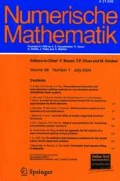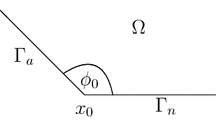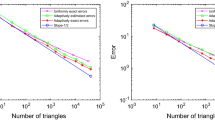Abstract
In the presence of re-entrant corners, the solution of PDE-constrained optimization problems, in general, has singular components, even when the given data are smooth. Consequently, the use of standard finite element discretization gives rise to the so-called ’pollution effect’. This means that only a reduced convergence rate, compared to the best approximation error, is obtained. We discuss how optimal convergence rates in weighted norms can be achieved using the idea of energy corrected finite element methods, applied to optimal Dirichlet boundary control problem in the energy space. We present optimal error estimates in weighted norms for the state variable and for the control. Several numerical examples illustrate the obtained theoretical results.



Similar content being viewed by others
References
Apel, T., Mateos, M., Pfefferer, J., Rösch, A.: On the regularity of the solutions of Dirichlet optimal control problems in polygonal domains. SIAM J. Control Optim. 53(6), 3620–3641 (2015)
Apel, T., Nicaise, S., Schöberl, J.: A non-conforming finite element method with anisotropic mesh grading for the Stokes problem in domains with edges. IMA J. Numer. Anal. 21(4), 843–856 (2001)
Apel, T., Pfefferer, J., Rösch, A.: Finite element error estimates on the boundary with application to optimal control. Math. Comput. 84(291), 33–70 (2015)
Apel, T., Sändig, A.-M., Whiteman, J.R.: Graded mesh refinement and error estimates for finite element solutions of elliptic boundary value problems in non-smooth domains. Math. Methods Appl. Sci. 19(1), 63–85 (1996)
Babuška, I., Strouboulis, T.: The Finite Element Method and Its Reliability. Numerical Mathematics and Scientific Computation. The Clarendon Press, Oxford University Press, New York (2001)
Bergounioux, M., Ito, K., Kunisch, K.: Primal-dual strategy for constrained optimal control problems. SIAM J. Control Optim. 37(4), 1176–1194 (1999). (electronic)
Blum, H.: The influence of reentrant corners in the numerical approximation of viscous flow problems. In: Numerical treatment of the Navier–Stokes equations (Kiel, 1989), Volume 30 of Notes Numer. Fluid Mechanics, pp. 37–46. Vieweg, Braunschweig (1990)
Brenner, S.C.: Multigrid methods for the computation of singular solutions and stress intensity factors. I. Corner singularities. Math. Comput. 68(226), 559–583 (1999)
Brenner, S.C., Scott, L.R.: The Mathematical Theory of Finite Element Methods, Volume 15 of Texts in Applied Mathematics, 3rd edn. Springer, New York (2008)
Cai, Z., Kim, S.: A finite element method using singular functions for the Poisson equation: corner singularities. SIAM J. Numer. Anal. 39, 286–299 (2001)
Casas, E., Mateos, M., Tröltzsch, F.: Error estimates for the numerical approximation of boundary semilinear elliptic control problems. Comput. Optim. Appl. 31(2), 193–219 (2005)
Ciarlet, P.G., Lions, J.L.: Handbook of Numerical Analysis, vol. II. Finite Element Methods (Part 1). North Holland, Amsterdam, New York, Oxford (1991)
Collis, S.S., Ghayour, K., Heinkenschloss, M., Ulbrich, M., Ulbrich, S.: Optimal control of unsteady compressible viscous flows. Int. J. Numer. Methods Fluids 40(11), 1401–1429 (2002)
de los Reyes, J.C., Kunisch, K.: A semi-smooth Newton method for control constrained boundary optimal control of the Navier–Stokes equations. Nonlinear Anal. 62(7), 1289–1316 (2005)
Egger, H., Rüde, U., Wohlmuth, B.: Energy-corrected finite element methods for corner singularities. SIAM J. Numer. Anal. 52(1), 171–193 (2014)
Fix, G.: Higher-order Rayleigh–Ritz approximations. J. Math. Mech. 18, 645–657 (1968/1969)
Glowinski, R., Lions, J.L., Trémoliéres, R.: Numerical Analysis of Variational Inequalities. Elsevier, Amsterdam (2011)
Grisvard, P.: Elliptic Problems in Nonsmooth Domains. Pitman, Boston (1985)
Haroske, D.D., Triebel, H.: Distributions, Sobolev Spaces, Elliptic Equations. European Mathematical Society, Warsaw (2008)
Hintermüller, M., Ito, K., Kunisch, K.: The primal-dual active set strategy as a semismooth newton method. SIAM J. Optim. 13(3), 865–888 (2002)
Hintermüller, M., Kovtunenko, V.A., Kunisch, K.: The primal-dual active set method for a crack problem with non-penetration. IMA J. Appl. Math. 69(1), 1–26 (2004)
Hinze, M., Pinnau, R., Ulbrich, M., Ulbrich, S.: Optimization with PDE Constraints, volume 23 of Mathematical Modelling: Theory and Applications. Springer, New York (2009)
Hömberg, D., Meyer, C., Rehberg, J., Ring, W.: Optimal control for the thermistor problem. SIAM J. Control Optim. 48(5), 3449–3481 (2009/2010)
Hsiao, G.C., Wendland, W.L.: Boundary Integral Equations. Springer, Berlin (2008)
Huber, M., John, L., Pustejovska, P., Rüde, U., Waluga, C., Wohlmuth, B.: Solution techniques for the Stokes system: a priori and a posteriori modifications, resilient algorithms. In: Proceedings of the 8th International Congress on Industrial and Applied Mathematics, pp. 109–134. Higher Ed. Press, Beijing (2015)
John, L.: Optimal Boundary Control in Energy Spaces Preconditioning and Applications. Monographic Series TU Graz, Computation in Engineering and Science, vol. 24 (2014)
John, L., Pustejovska, P., Wohlmuth, B., Rüde, U.: Energy-corrected finite element methods for the Stokes system. IMA J. Numer. Anal. (published online) (2016)
Kikuchi, N., Oden, J. T.: Contact Problems in Elasticity: A Study of Variational Inequalities and Finite Element Methods. Studies in Applied and Numerical Mathematics. Society for Industrial and Applied Mathematics, Philadelphia (1988)
Kondratiev, V.A.: Boundary value problems for elliptic equations in domains with conical or angular points. Trans. Mosc. Math. Soc. 16, 227–313 (1967)
Kufner, A.: Weighted Sobolev spaces. A Wiley-Interscience Publication. Wiley, New York (1985). Translated from the Czech
Kunisch, K., Vexler, B.: Optimal vortex reduction for instationary flows based on translation invariant cost functionals. SIAM J. Control Optim. 46(4), 1368–1397 (2007)
Lions, J.-L.: Optimal Control of Systems Governed by Partial Differential Equations. Springer, Berlin, Heidelberg (1971)
Lubuma, J.M.-S., Patidar, K.C.: Towards the implementation of the singular function method for singular perturbation problems. Appl. Math. Comput. 209, 68–74 (2009)
Meyer, C., Rösch, A.: Superconvergence properties of optimal control problems. SIAM J. Control Optim. 43(3), 970–985 (2004). (electronic)
Of, G., Phan, T.X., Steinbach, O.: An energy space finite element approach for elliptic Dirichlet boundary control problems. Numer. Math. 129(4), 723–748 (2015)
Rüde, U.: Local corrections for eliminating the pollution effect of reentrant corners. Technical Report TUM-INFO-02-89-I01, Institut für Informatik, Technische Universtät München (1989)
Rüde, U., Waluga, C., Wohlmuth, B.: Nested Newton strategies for energy-corrected finite element methods. SIAM J. Sci. Comput. 36(4), A1359–A1383 (2014)
Rüde, U., Zenger, C.: On the treatment of singularities in the multigrid method. In: Hackbusch, Wolfgang, Trottenberg, Ulrich (eds.) Multigrid Methods II, Volume 1228 of Lecture Notes in Mathematics, pp. 261–271. Springer, Berlin, Heidelberg (1986)
Scott, L.R., Zhang, S.: Finite element interpolation of nonsmooth functions satisfying boundary conditions. Math. Comput. 54(190), 483–493 (1990)
Spann, W.: On the boundary element method for the Signorini problem of the Laplacian. Numer. Math. 65, 337–356 (1993)
Steinbach, O.: Boundary element methods for variational inequalities. Numer. Math. 126(1), 173–197 (2014)
Toselli, A., Widlund, O.: Domain Decomposition Methods—Algorithms and Theory, Volume 34 of Springer Series in Computational Mathematics. Springer, Berlin (2005)
Tröltzsch, F.: Optimal Control of Partial Differential Equations. Theory, Methods and Applications. American Mathematical Society, Providence (2010)
Zenger, C., Gietl, H.: Improved difference schemes for the Dirichlet problem of Poisson’s equation in the neighbourhood of corners. Numer. Math. 30(3), 315–332 (1978)
Acknowledgements
The financial support by the German Research Foundation (DFG) trough grant WO 671/11-1 and through the International Research Training Group IGDK 1754 “Optimization and Numerical Analysis for Partial Differential Equations with Nonsmooth Structures” is gratefully acknowledged.
Author information
Authors and Affiliations
Corresponding author
Rights and permissions
About this article
Cite this article
John, L., Swierczynski, P. & Wohlmuth, B. Energy corrected FEM for optimal Dirichlet boundary control problems. Numer. Math. 139, 913–938 (2018). https://doi.org/10.1007/s00211-018-0952-8
Received:
Revised:
Published:
Issue Date:
DOI: https://doi.org/10.1007/s00211-018-0952-8




